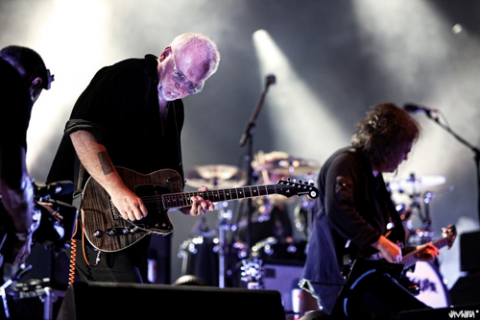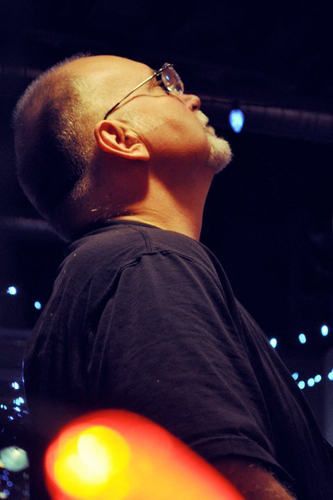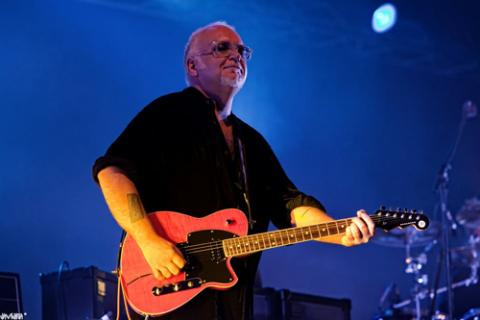Alumni Profile: Reeves Gabrels

Berklee alumnus Reeves Gabrels has reunited with Robert Smith (right) to tour with the Cure this summer in Europe. Here, the band performs in Barcelona during the Primavera Sound Festival.
Photo by Javier Juarez

Gabrels spent more than a decade performing with David Bowie, including for his hard rock band, Tin Machine.
Photo by Corie Lewis

Gabrels credits the lessons he learned at Berklee for expanding his harmonic knowledge.
Photo by Javier Juarez
After spending more than a decade as David Bowie's guitarist, Reeves Gabrels had settled into a quieter but still quite active phase of his career, writing and producing his own material, composing soundtracks for films and video games, and stretching his improvisational prowess while peforming periodically with Boston-based Club d'Elf—a genre-defying band that embraces everything from jazz to hip-hop to electronica.
The Berklee alumnus kept in regular contact with the Cure's Robert Smith (with whom he collaborated in the '90s on the Cure's "Wrong Number" track and the side project COGASM), but mostly about making dinner plans while both were in London. The dinner never materialized but their last email exchange had the effect of bringing Gabrels back out into the spotlight. On short notice, he accepted Smith's invitation to join the Cure for its European summer tour, and it's a role the idiosyncratic rock guitarist has embraced wholeheartedly.
Looking back on the forces that have influenced his music and provided him with a solid foundation through such a wide-sweeping career trajectory, the Nashville-based, Grammy-nominated artist counts Berklee high on that list. He arrived on campus more than 30 years ago by way of New York, thanks to encouragement from alumnus John Scofield '73, who was giving him private lessons at the time. He credits Berklee for expanding his harmonic approach to guitar and he continues to bring that sensibility to his music today.
While stopping over in London during the Cure's summer European tour—just back from Moscow and heading to Sweden—Gabrels shared some highlights from reuniting with Smith, how Berklee gave his music more dimension, and aspirations to return to his alma mater to complete his degree.
The following is a condensed and edited version of that conversation.
How did you and Robert Smith reconnect?
At the end of April, he emailed: "What are you doing this summer? For the whole summer?" I said, "If you're asking what I think you're asking, nothing that can't change." He said, "This is what's going on. I'm the only guitar player and I really miss having a wingman." He said it would only be 30 songs. It turned out to be 52 songs. I think I had just under two weeks to learn them. I got here and I think we whittled those down to a primary core of 40 songs.
What's it like working with Robert again?
Robert has a very distinctive guitar style. He's a very interesting player. For a good portion of the night, I'm in a support role, which is an interesting experience. Usually I'm the guy out on the ledge. Now I'm the guy holding the shirt of the guy on the ledge so he doesn't fall.
What are the set lists like?
It's been across the board spanning the Cure's 30-year history. We've gone very deep into their catalogue, including some B-sides they haven't played live before. When I checked out [their catalogue] album by album, at least a couple of songs on every album went into the mainstream consciousness. The audience is just amazing to see, probably 12-year-olds to people into their '60s, all singing along.
What about your time with David Bowie?
I learned a long time ago with Bowie that when you're working with an artist who has a history of well-known songs, there's an obligation [to be faithful to the material]. Ego is an interesting thing. You have to sublimate yourself to the music to do the job right.
When I got in there, my responsibility was to move the music along, not to restate it. When I was there, he let me work so my music fit with new material. It was a really good run. I wrote like 50-something songs in that span of time, recorded seven albums, and produced half of those.
Talk about your work with Boston-based Club d'Elf and how that compares to your latest gig.
That's kind of where I'm happiest. I have time to meander and harmonically poke at things, make the music interesting. . . [Now, with the Cure] I'm trying to refine that down to opportunities where I can hit that one note that throws the world off its axis for two bars. That's the challenge. On other hand, Robert and the band know my playing. It's a nice situation. There were two songs we played Monday night that I had only played with the band once. I like the adrenaline and risk-taking aspect of that. On other hand, for me it's easier to take chances in front of 60,000 people versus two people in a room.
What brought you to Berklee?
I wanted to know more about harmony and expand my harmonic knowledge. When I went there it was still more of a jazz school and the rock stuff was just starting to rear its head. . . Back in the late '70s and early '80s, all the guys who were doing innovative and cool stuff seemed to come through Berklee as far as guitar players. When I got there, Mike Stern was just graduating. I went there at the same time as Steve Vai. Bill Frisell started taking over Mike Stern's gigs when Mike got a gig with Miles Davis. That was the environment I was in and those were the guys I was looking to for trailblazing.
It was a great place to learn. . . [As a result] whatever it is I do is probably harmonically more expanded than your average rock guy. John Scofield said when I was 22 or 21, "You already know all the guitar licks. You should be listening to sax melodies and keyboard players' left hands."
Any pivotal moments at Berklee?
It was at the end of my first semester, and I was a little bit in shock because I was not a real sight-reader and I was coming up short getting into ensembles. I was sitting in the hallway one day and Mike Hatfield was teaching a vocal ensemble. He asked if I wanted to sit in on the ensemble because the guitar player just wasn't showing up. I said sure, and went and did it and it was fun. He said, "Why not come back next week and if the guy doesn't show up, I'll sign you in as part of the class." It became one of my classes. I was able to get in the same thing with him the next semester. He gave me my first set of 7s and 8s (ratings) so then I could get into other ensembles. It's just like any other break you get out there in the real world. Mike kind of gave me my confidence back after having it shaken.
How do you bring some of the lessons you learned at Berklee to your playing?
How this relates to the Cure is through the harmonic possibilities in their music. It's there and it's available, because they like to twist it. They like to throw the curve ball into the music, and there's a lot of space where I have the option to create interesting textures. . . But I have to also hit the [crux] note right off the bat. I have to find the right spin to put on the ball. I've got an obligation. It's about the songs and the lyrics. I don't want to ruin that for anyone. I have to play guitar parts that are attached to songs, but certain songs I can stretch out and there's plenty of solo room. I love the music and l love Robert. I don't want to do a disservice to the music.
Here's a fan video of Gabrels performing "Wrong Number" with the Cure at the Pinkpop 2012 festival in Maastricht, Holland this May.
I heard you're looking into completing your degree here.
I would like to pursue finishing. I left mid-semester—I was here five-and-a-half semesters—because I was working too much in bands. Guitar playing is just something I do. What I was really interested in here was harmony and arranging, advanced modal harmony. I had an 11-piece horn band at one point.
I've probably done 10 film scores, and scores for TV. I'd like to hone that skill a bit. Studying film scoring might be the way to go. I enjoy that. I like the solitary nature. It's a completely different beast. When I'm scoring stuff, I tend not to use the guitar all that much. I like writing for strings or acoustic instruments or just pure electronics.
